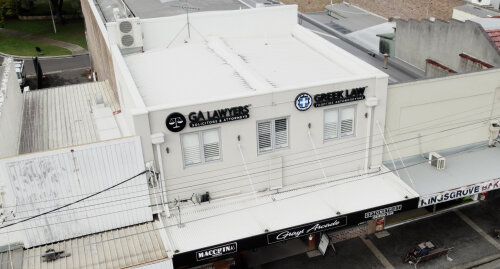Best Property Insurance Lawyers in Sydney
Share your needs with us, get contacted by law firms.
Free. Takes 2 min.
List of the best lawyers in Sydney, Australia
About Property Insurance Law in Sydney, Australia
Property insurance law in Sydney, Australia, is an essential aspect of personal and business protection, ensuring that property owners can safeguard their real estate investments against potential losses or damages. This type of insurance typically covers damages caused by events such as fires, storms, theft, and vandalism. The law governs the relationship between the insurer and the insured, specifying the rights, duties, and obligations of each party. In Sydney, property insurance is influenced by both state and federal legislation, and understanding the intricacies can help in the event of a claim or dispute.
Why You May Need a Lawyer
There are several common situations where individuals and businesses may need legal help with property insurance:
- Claims Denial: If an insurance company denies a claim that you believe should be covered, legal assistance can help challenge the denial.
- Disputed Claims: If there is a disagreement about the value of a claim or coverage limits, a lawyer can help mediate and resolve these disputes.
- Policy Understanding: Many find insurance policies complex; a lawyer can help interpret policy terms and advise on coverage aspects.
- Settlement Negotiations: In cases where the insurer offers an inadequate settlement, a lawyer can negotiate for a fair resolution.
- Bad Faith Insurance: If an insurance company acts in bad faith, not honoring their part of the contract, a lawyer can help hold them accountable.
Local Laws Overview
The key aspects of local laws relevant to property insurance in Sydney, Australia, revolve around the insurance contract itself, the legal framework provided by the Insurance Contracts Act 1984, and consumer protection laws. Key features include:
- Duty of Disclosure: Insured parties are required to disclose any material facts that could affect the insurer's decision to provide coverage.
- Provisions of the Insurance Contracts Act: The Act regulates the content and form of insurance contracts, ensuring fair terms and obligations are set for both parties.
- Consumer Rights: The Australian Competition and Consumer Commission (ACCC) provides guidance on consumer rights related to insurance products.
- State-based Regulations: New South Wales laws, including specific legislation around strata schemes, can affect insurance requirements for properties.
Frequently Asked Questions
What is property insurance?
Property insurance is a type of coverage that protects against risks to property, such as fire, theft, and some weather damage. It can include coverage for property owners, renters, and businesses.
Do I need property insurance in Sydney?
While not legally required for homeowners, property insurance is highly recommended to protect against potential financial losses from unforeseen damage or loss of property.
Can a property insurance claim be denied?
Yes, claims can be denied for reasons including insufficient coverage, non-disclosure of important information, or claims made for events not covered by the policy.
How do I dispute an insurance claim denial?
Start by reviewing your policy details to ensure that the claim was covered. Contact your insurance company to discuss the denial, and consider seeking legal advice if the issue remains unresolved.
What is 'duty of disclosure' in property insurance?
The duty of disclosure requires policyholders to inform the insurer of any significant information that might influence the insurer's decision to accept the risk.
What steps should I take if my property is damaged?
Immediately document the damage with photos and videos, contact your insurer to file a claim, and adhere to any procedures outlined in your policy for repair or maintenance.
What is the Insurance Contracts Act 1984?
This is federal legislation that regulates insurance contracts, aiming to balance the rights and obligations of insurer and insured, ensuring they are clearly defined and fair.
Can I change my property insurance policy?
Yes, you can switch policies or providers, but review your current policy terms for cancellation conditions and ensure uninterrupted coverage during any transition.
How are premiums determined?
Premiums are typically based on the risk level the insurance company associates with your property, considering factors such as location, property value, and past claims.
What is bad faith in insurance?
Bad faith refers to dishonest practices by an insurer, such as unjustly refusing a valid claim, delaying payment, or misrepresenting policy terms. Legal recourse is available in such cases.
Additional Resources
Here are some resources and organizations that can assist you with property insurance issues in Sydney:
- Insurance Council of Australia: Offers consumer information and resources on understanding insurance.
- NSW Fair Trading: Provides guidance and assistance for consumers dealing with insurance disputes.
- Australian Financial Complaints Authority (AFCA): Handles complaints about financial products, including insurance.
- Australian Competition and Consumer Commission (ACCC): Offers advice on consumer rights with insurance products.
Next Steps
If you find yourself needing legal assistance with property insurance in Sydney, consider the following steps:
- Review Your Policy: Carefully review your insurance policy to understand your coverage and obligations.
- Document Everything: Maintain thorough documentation of any claims, correspondence, and responses from your insurer.
- Contact a Lawyer: Seek legal advice, especially for complex disputes or if you suspect bad faith practices by your insurer.
- File a Complaint: If negotiations fail, contact bodies like AFCA for assistance with dispute resolution.
- Stay Informed: Keep informed about your rights and changes in local property insurance laws and regulations.
Lawzana helps you find the best lawyers and law firms in Sydney through a curated and pre-screened list of qualified legal professionals. Our platform offers rankings and detailed profiles of attorneys and law firms, allowing you to compare based on practice areas, including Property Insurance, experience, and client feedback.
Each profile includes a description of the firm's areas of practice, client reviews, team members and partners, year of establishment, spoken languages, office locations, contact information, social media presence, and any published articles or resources. Most firms on our platform speak English and are experienced in both local and international legal matters.
Get a quote from top-rated law firms in Sydney, Australia — quickly, securely, and without unnecessary hassle.
Disclaimer:
The information provided on this page is for general informational purposes only and does not constitute legal advice. While we strive to ensure the accuracy and relevance of the content, legal information may change over time, and interpretations of the law can vary. You should always consult with a qualified legal professional for advice specific to your situation.
We disclaim all liability for actions taken or not taken based on the content of this page. If you believe any information is incorrect or outdated, please contact us, and we will review and update it where appropriate.













